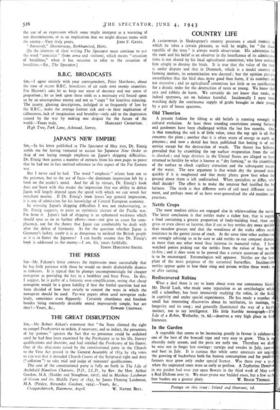• COUNTRY LIFE
A LANDOWNER in Shakespeare's country possesses a small rookery in which he takes a certain pleasure, as well he might, for " the black republic of the trees" is always worth observation. His admiration for the rook and his belief as an observer in the beneficence of its administra- tions is not shared by his local agricultural committee,'who have ordered him crisply to destroy the birds. It is true that the value of the rook is under dispute and that in Denmark, which is a model country in farming matters, its extermination was decreed ; but the opinion prevails nevertheless that the bird does more good than harm, if its numbers are not excessive ; and an agricultural committee has little or no justification for a drastic order for the destruction of nests or young. We know that rats and rabbits do harm. We certainly do not know that rooks, or indeed sparrows, are on balance harmful. Incidentally I nave been watching daily the continuous supply of grubs brought to their young by a pair of house sparrows.
Old Theories A present fashion for tilting at old beliefs is running strongly in cultural evolution. At least three standing convictions among farmers and gardeners have been challenged within the last few months. One is that trenching the soil is of little value, since the top spit is all that concerns the plant ; another that it is often waste of energy to earth up potatoes ; and now a denial has been published that hoeing is of any service except for the destruction of weeds. The theory has hitherto prevailed that by crumbling the top surface evaporation from the soil is checked ; and large districts in the United States are alleged to have returned to fertility by .what is known as " dry farming," or the crumbling of the surface to check capillary attraction and the subsequent escape of the water. The new argument is that winds dry the ground more quickly if it is roughened and that many plants grow best when the ground about them is left undisturbed. When specialists so differ, who shall decide? The effect is to make the amateur feel justified for. his laziness. The truth is that different sorts of soil need different treat- ment, and perhaps most of us have over-generalised the old maxims an practices.
Nettle Crops The most modern critics are engaged also in whitewashing the nettle The latest conclusion is that nettles make a richer hay, that is supply a food containing a greater proportion of body-building food, than any grass or even clover or lucerne, that if cut as hay nettles dry more quick than meadow grasses and that the woodiness of the stalks offers small resistance to the gastric juices of stock. At the same time other authoriti are strongly advising us to be sure to add nettles to our compost dumps, as more than any other weed they increase its manurial value. I have watched ponies picking out the nettles from the ration of hay as tit-bits ; and it does seem to be proved that a certain quantum of nettlei is to be encouraged. Entomologists will approve. Nettles are the host plant of the most gorgeous of the autumnal butterflies. Incidentally nettles appear quite to lose their sting and poison within three weeks of so after cutting.
Rediscovered Robins What a deal there is yet to learn about even our commonest birds. Mr. David Lack, who made some reputation as an ornithologist wit. still a schoolboy, has been intensively studying the robin, in the fie in captivity and under special experiments. He has made a number small but interesting discoveries about its territories, its matings, 1 longevity and its song ; and generally illuminated the way of a bird' instinct, not to say intelligence. His little humble monograph—T Life of a Robin, Wetherby, 7s. 6d.—deserves a very high place in bi literature.
In the Garden A vegetable that seems to be increasing greatly in favour is calabree one of the best of the broccoli type and very easy to grow. This is absurdly early season, and the pests are early too. Therefore we shit be wise not to forget late sowings: turnips and swedes in July, carro and beet in July. It is curious that while some amateurs are urgin the growing of buckwheat both for human consumption and for poultrs' farmers may grow only under special licence. Was there ever a yes when the unpruned roses were so early or profuse. A Zephyrine Drouhi, in my garden had over 200 open flowers in the third week of May and a Red Dickson over 7o. We must prune our bedded roses, but a few su
Postage on this issue : Inland and Overseas, id.


























 Previous page
Previous page